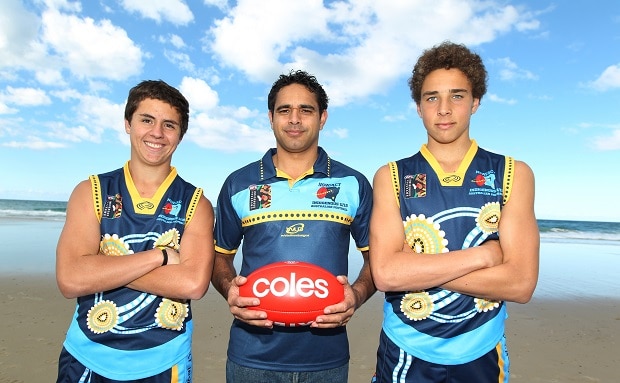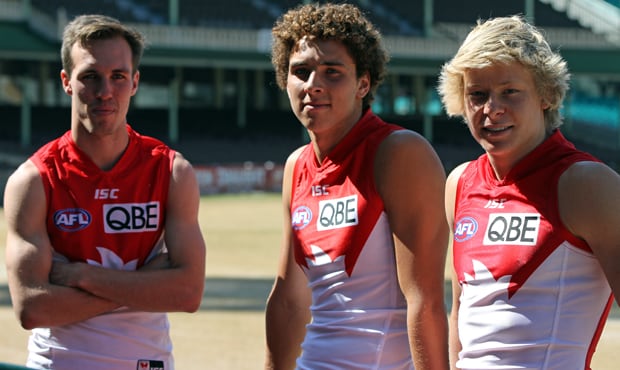Abe Davis is a proud Indigenous man. But pride in his heritage is something Davis once grappled with.
After falling out with his father not so long ago, the 20-year-old struggled to embrace his culture.
“It was quite a difficult time for me,” Davis explained.
“By separating myself from him, I didn’t know whether I’d be separating myself from my culture as well. I couldn’t comprehend doing one thing and not doing the other.
“But as bad as the time was, I have met too many good people along the way to turn my back on it. They outnumber the bad things by a long way.”
Splitting ways with his father meant a crucial link to his heritage was lost. Indeed, that link only hung by a thread in the first place.
Davis is a Torres Strait Islander. He’s connected to the Kusu clan with many of his relatives from Thursday Island, Badu Island and Horn Island, three of the many pieces of land floating between the top tip of Queensland and southern shores of Papua New Guinea.
Torres Strait Islanders are seafaring people which probably explains Davis’ love for the ocean. On any given day Davis takes to the water with his surfboard. Most people born in Sydney love the seaside but he’s convinced there’s a deep-seated connection there.
His Indigenous roots are important to him, but it wasn’t always that way, not with his father in the picture.
Apart from the colour of his skin and his fuzzy afro, reminiscent of the Papuan and Melanesian influences on the Torres Strait Islander people, Davis didn’t have much else to hold on to.

Abe Davis (right) pictured here with fellow NSW captain Daniel Briggs (left) and coach Rodney Craig (centre) during the 2011 Kickstart National Championships on the Gold Coast. Davis talked highly of Kickstart Program in helping to provide a clearer pathway.
Graham Davis hardly talked about the family. He didn’t really open up about anything, not to his eldest son anyway, not even the fact he’d been a prominent basketballer in his heyday.
Any 10-year-old would have been in awe knowing their dad had played national ball with the Sydney Kings.
“Some of the older blokes around the association started treating me differently when they found out who I was,” Davis said.
“I looked up on the wall one day after a training session. One of the awards was named after dad. I asked him about it when I got home. He took me out into the shed one night and opened up bags and bags of trophies.
“I didn’t really know who I was at that stage, let alone anything about dad’s past. I’m fine with that as he probably wasn’t the best role model to be following anyway.”
Davis has had to learn and accept the hard way, very much on his own accord. His mother, Karen, was a guiding light and his younger brother, Ben, has been there for him as well but he’s relied on others for that ‘fatherly’ influence.
His junior footy coaches were important while his enduring friendship with now teammate Jordan Foote provided Davis with a home away from home. He also sought direction from the many “incredible” people behind the scenes of the AFL’s Indigenous programs and pathways which helped him achieve everything to this point in time.
It was during the Flying Boomerangs’ tour of Fiji in 2012 that Davis decided to never forget where he comes from.
“I got talking with a few of the older guys who knew about this stuff. They basically told me that you’ve got a week with us to decide whether you want to separate yourself from that part of your life. It was my choice,” he said.
“I don’t think people in these programs know just how hard they’re working and what kind of an impact they’re having on Indigenous people. It’s mind-blowing the lengths they go to.
“I got to know a few of the other Torres Strait Islander boys, including Kuiam (Anu) who’s now one of my best mates. The four of us got on really, really well. From that moment on I knew that it wasn’t something I wanted to get rid of.”
Davis’ time at the Sydney Swans, first through the academy system and the past two years on the senior list, has also been life changing.

Abe Davis (centre) with fellow QBE Sydney Swans Academy graduates Jack Hiscox and Isaac Heeney after their selections in the 2014 National Draft.
He’s yet to play a senior game but that hasn’t worried him. To simply walk the same corridors as his childhood heroes has been rewarding enough.
He remembers last year’s Indigenous Round Launch with admiration. The moment is captured forever. There’s a wonderful photo of Davis standing side-by-side Adam Goodes, Lance Franklin, Lewis Jetta and the great Michael Long.
“I forgot I was a listed player for a second. I just stood there in awe,” he added.
“I grew up watching Buddy, more so Goodesy and Andrew McLeod. I’ve been lucky to meet them all and to see just how in touch with it they are has been pretty special.
“They’ve showed me that it is okay to care. They showed me the sort of respect the guys who came before us deserved and shed so much light on what they had to go through just to play. I went through some racial stuff when I was younger, I couldn’t imagine what they went through.
“It's those guys who have paved the way for my generation and future generations to play footy.”
Davis has never stepped foot on Thursday Island’s shores or even visited Torres Strait for that matter. He's hardly been out of Sydney. He hopes to make the journey one day, a decision he made early on but the opportunity never came about. He longs to know what it looks like, to smell the ocean breeze and to maybe reunite with family.
He and Anu, who’s quite articulate in the native tongue, hope to make that trip together sooner rather than later.
In the meantime, Davis will soak up the significance of this weekend’s Indigenous Round knowing at the end of it all he no longer has to grapple with who he is or where he came from.



